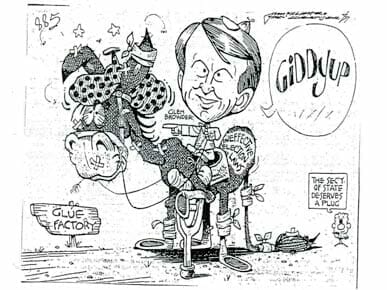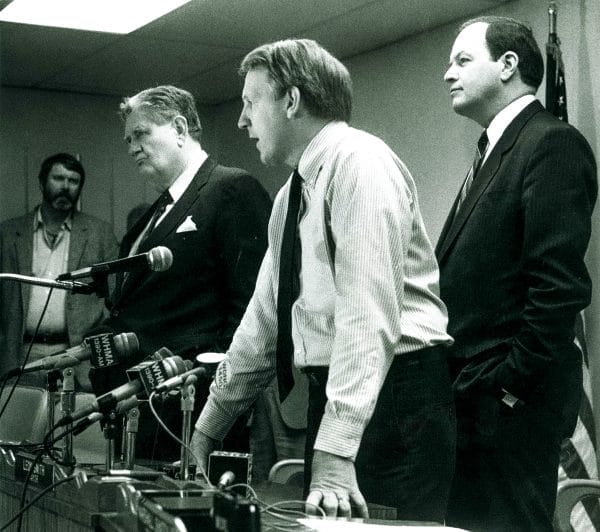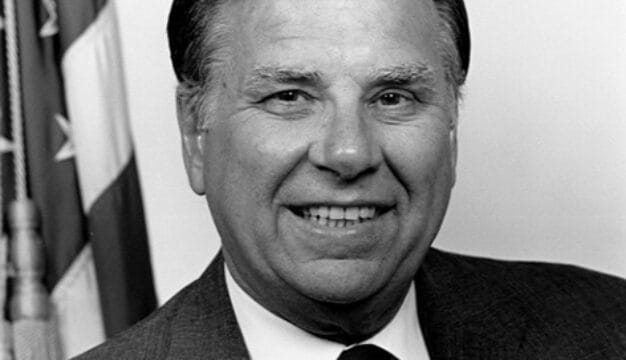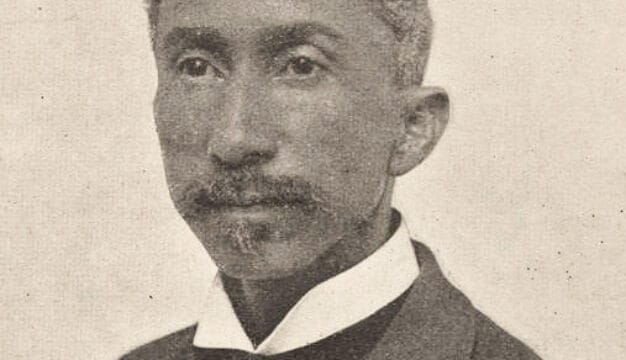Glen Browder
John Glen Browder (1943- ) served in the U.S. House of Representatives from 1989 to 1997 for Alabama’s Third District. A moderate Democratic representative, Browder focused his legislative attention on budget, campaign finance, and education reform and national security. He also served one term as Alabama’s Secretary of State and in the Alabama House of Representatives. More recently, Browder has been a professor of political science at Jacksonville State University and authored several books.
 Glen Browder
Generally known as Glen, Browder was born in Sumter, South Carolina, on January 4, 1943, to Archie Calvin and Ila Frierson Browder. His early education came from public schools, and he graduated from Edmunds High School in 1961. He attended Presbyterian College in Clinton, South Carolina, from which he received a B.A. in history in 1965. The following year, he worked as a sportswriter for the Atlanta Journal and from 1966 to 1968 was an investigator with the U.S. Civil Service Commission. He married Rebecca Moore on February 4, 1967, and the couple would have one child, a daughter.
Glen Browder
Generally known as Glen, Browder was born in Sumter, South Carolina, on January 4, 1943, to Archie Calvin and Ila Frierson Browder. His early education came from public schools, and he graduated from Edmunds High School in 1961. He attended Presbyterian College in Clinton, South Carolina, from which he received a B.A. in history in 1965. The following year, he worked as a sportswriter for the Atlanta Journal and from 1966 to 1968 was an investigator with the U.S. Civil Service Commission. He married Rebecca Moore on February 4, 1967, and the couple would have one child, a daughter.
Browder continued his education at Emory University in Atlanta, Georgia, where he earned an M.A. degree and a Ph.D. in political science in 1971. His dissertation was titled “Party Activists in a Suburban Southern Community: A Case Study of DeKalb County, Georgia.” In 1971, he became a professor of political science at Jacksonville State University (JSU) in Jacksonville, Calhoun County, where he devoted his attention to polling, research, and political consulting. He additionally served as president of Data Associates, a private consulting agency, in Anniston, Calhoun County, from 1978 to 1987.
 Glen Browder Political Cartoon
Browder was a member of the Alabama Delegation to the 1980 Democratic National Convention in New York City. In 1982, he ran successfully as a Democrat for a seat in the Alabama House of Representatives. In 1983, he served on the Constitutions and Elections Committee, Joint Interim Committee on Constitutional Revision, and Conference Committee on Constitutional Revision. The following year, he was a member of the Ways and Means Committee, Local Government Committee, and Local Legislation Committee and in 1984 was vice-chairman of the Governor’s Education Reform Commission. Browder served as chairman of the Alabama Historical Records Advisory Board Legislative Oversight Committee. He was the primary sponsor of important education reform acts, the Victims Compensation Act, the Police and Firemen Death Benefits Act, and the Slain Law Enforcement Officers Monument Resolution. He served as the Alabama Secretary of State from 1987 to 1989 and led the passage of the Alabama Fair Campaign Practices Act. Following the death of Democratic congressman William F. Nichols in 1988, Browder defeated Republican John Rice in a special election to represent Alabama’s Third District, which encompasses 12 counties in the eastern part of the state. He would win three more terms, defeating Republican challenger Don Sledge of Valley by wide margins in 1990 and 1992 and Republican Ben Hand of Auburn in 1994.
Glen Browder Political Cartoon
Browder was a member of the Alabama Delegation to the 1980 Democratic National Convention in New York City. In 1982, he ran successfully as a Democrat for a seat in the Alabama House of Representatives. In 1983, he served on the Constitutions and Elections Committee, Joint Interim Committee on Constitutional Revision, and Conference Committee on Constitutional Revision. The following year, he was a member of the Ways and Means Committee, Local Government Committee, and Local Legislation Committee and in 1984 was vice-chairman of the Governor’s Education Reform Commission. Browder served as chairman of the Alabama Historical Records Advisory Board Legislative Oversight Committee. He was the primary sponsor of important education reform acts, the Victims Compensation Act, the Police and Firemen Death Benefits Act, and the Slain Law Enforcement Officers Monument Resolution. He served as the Alabama Secretary of State from 1987 to 1989 and led the passage of the Alabama Fair Campaign Practices Act. Following the death of Democratic congressman William F. Nichols in 1988, Browder defeated Republican John Rice in a special election to represent Alabama’s Third District, which encompasses 12 counties in the eastern part of the state. He would win three more terms, defeating Republican challenger Don Sledge of Valley by wide margins in 1990 and 1992 and Republican Ben Hand of Auburn in 1994.
 Glen Browder and Soldiers
While in Congress, Browder served on the House Budget Committee, the Committee on Science, Space, and Technology, and the National Security Committee (formerly the Armed Services Committee), where he was a member of the military installations and facilities subcommittee, military readiness subcommittee, and ranking member of the special oversight panel on morale, welfare and recreation. He also was a member of numerous congressional caucuses, including the Army Caucus, Arts Caucus, Biomedical Research Caucus, Unfunded Mandates Caucus, Coal Group, Rural Caucus, Space Caucus, Textile Caucus, Depot/Plant Caucus, and the Rural Health Care Coalition. In addition, he helped found the Blue Dog Coalition, which is a group of congressional Democrats who take conservative positions on issues relating to federal spending and national defense.
Glen Browder and Soldiers
While in Congress, Browder served on the House Budget Committee, the Committee on Science, Space, and Technology, and the National Security Committee (formerly the Armed Services Committee), where he was a member of the military installations and facilities subcommittee, military readiness subcommittee, and ranking member of the special oversight panel on morale, welfare and recreation. He also was a member of numerous congressional caucuses, including the Army Caucus, Arts Caucus, Biomedical Research Caucus, Unfunded Mandates Caucus, Coal Group, Rural Caucus, Space Caucus, Textile Caucus, Depot/Plant Caucus, and the Rural Health Care Coalition. In addition, he helped found the Blue Dog Coalition, which is a group of congressional Democrats who take conservative positions on issues relating to federal spending and national defense.
 Glen Browder and Gen. Norman Schwarzkopf
While on the military installations subcommittee, Browder fought unsuccessfully against the possible closure of Fort McClellan in Anniston, which employed several thousand civilians. He helped write legislation that restructured the Department of Defense’s Base Realignment and Closure Commission, trying to change the process to save the fort. He also helped slow the effort and co-founded the “Fairness Network,” a coalition of members of Congress throughout the country whose districts would be affected by the base closings. And, being knowledgeable about biological and chemical weapons, Browder argued for the importance of McClellan to the nation’s defense. McClellan survived two rounds of closings but finally was shut down in 1995.
Glen Browder and Gen. Norman Schwarzkopf
While on the military installations subcommittee, Browder fought unsuccessfully against the possible closure of Fort McClellan in Anniston, which employed several thousand civilians. He helped write legislation that restructured the Department of Defense’s Base Realignment and Closure Commission, trying to change the process to save the fort. He also helped slow the effort and co-founded the “Fairness Network,” a coalition of members of Congress throughout the country whose districts would be affected by the base closings. And, being knowledgeable about biological and chemical weapons, Browder argued for the importance of McClellan to the nation’s defense. McClellan survived two rounds of closings but finally was shut down in 1995.
Browder was devoted to reforming campaign finance and opposed public financing of campaigns. Critical of past campaign finance reform bills, Browder took a leading role in drafting a reform bill in 1993. However, the Ways and Means Committee removed his provision to tax contributions to candidates who rejected spending limits. That September, he introduced a campaign finance reform bill that imposed a tax on campaign receipts of more than $600,000, but the bill was referred to the Subcommittee on Telecommunications and Finance and ultimately was not passed.
 Glen Browder with Bill Clinton
Browder did not always vote in lock-step with his fellow Democrats in the House. In 1993, for instance, he split from the majority to vote against Pres. Bill Clinton’s Family and Medical Leave Act and the National Voter Registration Act, which would have registered individuals to vote when registering automobiles. Also in 1993, Browder opposed Clinton’s five-year deficit-reduction plan, after supporting the president’s budget proposal and economic stimulus plan earlier in the year. Clinton’s 1993 budget proposal included deep spending cuts, but the deficit reduction plan relied on tax increases. Republicans and conservative Democrats were upset by the heavy reliance on tax increases, and the Omnibus Budget Reconciliation Act was narrowly approved in the House 218-217 and 51-50 in the Senate. The following year, he voted against safeguarding access to abortion clinics and the General Agreement on Tariffs and Trade (GATT) and for welfare reform in 1996, all of which became law. However, he had aligned with his party to back the 1991 Civil Rights Act that governed discrimination in the workplace, overturn a ban on abortion counseling at federally funded clinics (proposed under Pres. Ronald Reagan and enforced under Pres. George H. W. Bush), and for a waiting period for handgun purchases. In 1994, he voted to ban certain assault weapons and in support of a major crime bill that became law.
Glen Browder with Bill Clinton
Browder did not always vote in lock-step with his fellow Democrats in the House. In 1993, for instance, he split from the majority to vote against Pres. Bill Clinton’s Family and Medical Leave Act and the National Voter Registration Act, which would have registered individuals to vote when registering automobiles. Also in 1993, Browder opposed Clinton’s five-year deficit-reduction plan, after supporting the president’s budget proposal and economic stimulus plan earlier in the year. Clinton’s 1993 budget proposal included deep spending cuts, but the deficit reduction plan relied on tax increases. Republicans and conservative Democrats were upset by the heavy reliance on tax increases, and the Omnibus Budget Reconciliation Act was narrowly approved in the House 218-217 and 51-50 in the Senate. The following year, he voted against safeguarding access to abortion clinics and the General Agreement on Tariffs and Trade (GATT) and for welfare reform in 1996, all of which became law. However, he had aligned with his party to back the 1991 Civil Rights Act that governed discrimination in the workplace, overturn a ban on abortion counseling at federally funded clinics (proposed under Pres. Ronald Reagan and enforced under Pres. George H. W. Bush), and for a waiting period for handgun purchases. In 1994, he voted to ban certain assault weapons and in support of a major crime bill that became law.
 Rep. Browder, Sen. Heflin, and Sen. Shelby
Browder won the TREA Senior Citizens League Congressional Friend of the Taxpayer Award in 1996 for returning more than $1.2 million to American taxpayers during his congressional career. Also while in Congress, he wrote numerous articles on chemical weapons and campaign reform. Browder sought Sen. Howell Heflin’s seat in 1996 but lost in the Democratic primary and was succeeded in the House of Representatives by Republican Robert “Bob” Riley.
Rep. Browder, Sen. Heflin, and Sen. Shelby
Browder won the TREA Senior Citizens League Congressional Friend of the Taxpayer Award in 1996 for returning more than $1.2 million to American taxpayers during his congressional career. Also while in Congress, he wrote numerous articles on chemical weapons and campaign reform. Browder sought Sen. Howell Heflin’s seat in 1996 but lost in the Democratic primary and was succeeded in the House of Representatives by Republican Robert “Bob” Riley.
Following his congressional career, Browder taught courses on “Congress and the Pentagon,” as a Distinguished Visiting Professor in the Department of National Security Affairs at the Naval Postgraduate School in Monterey, California, from 1997 to 2006. He wrote, lectured, consulted, and conducted seminars on democracy at high schools and universities in numerous countries throughout the world. In 1999, he became the Eminent Scholar in American Democracy at Jacksonville State University. In 2003, he was a Visiting Fellow at the Institute of Politics at Harvard University. Two years later, he was named Professor Emeritus of Political Science at Jacksonville State University. The board of trustees and the faculty of Presbyterian College in Clinton, South Carolina, presented Browder with an honorary Doctor of Public Service degree in 2005. Over the years, Browder participated in the Congress to Campus Program, managed by the John C. Stennis Center for Public Service Leadership and U.S. Association of Former Members of Congress (USAFMC).
 Glen Browder Biography
Browder has authored or coedited several books, his first being The Future of American Democracy: A Former Congressman’s Unconventional Analysis. His interest in the role racial politics played in the civil rights movement inspired two books, The South’s New Racial Politics: Inside the Race Game of Southern History (2009) followed by Stealth Reconstruction: An Untold Story of Racial Politics in Recent Southern History (2010), in collaboration with Artemesia Stanberry. Stealth Reconstruction examined the role of lesser-known civil rights activists and discussed the future of race relations. Browder noted that a new order of southern racial politics represents a modernized, measured mixture of hard history, progressive practicality, and biracial accommodation. More recently, he has written on southern politics and racial politics in the South for The Huffington Post, an online news journal. He resides in Jacksonville.
Glen Browder Biography
Browder has authored or coedited several books, his first being The Future of American Democracy: A Former Congressman’s Unconventional Analysis. His interest in the role racial politics played in the civil rights movement inspired two books, The South’s New Racial Politics: Inside the Race Game of Southern History (2009) followed by Stealth Reconstruction: An Untold Story of Racial Politics in Recent Southern History (2010), in collaboration with Artemesia Stanberry. Stealth Reconstruction examined the role of lesser-known civil rights activists and discussed the future of race relations. Browder noted that a new order of southern racial politics represents a modernized, measured mixture of hard history, progressive practicality, and biracial accommodation. More recently, he has written on southern politics and racial politics in the South for The Huffington Post, an online news journal. He resides in Jacksonville.
Works by Browder
The Future of American Democracy: A Former Congressman’s Unconventional Analysis (2002)
The South’s New Racial Politics: Inside the Race Game of Southern History (2009)
Stealth Reconstruction: An Untold Story of Racial Politics in Recent Southern History, with Artemesia Stanberry (2010)
South Carolina’s Turkish People: A History and Ethnology (2018)
Further Reading
- Browder Collection, Jacksonville State University Library, Jacksonville, Alabama.
- Certain, Geni. Professor-Politician: The Biography of Alabama Congressman Glen Browder. Montgomery, Ala.: NewSouth Books, 2012.



